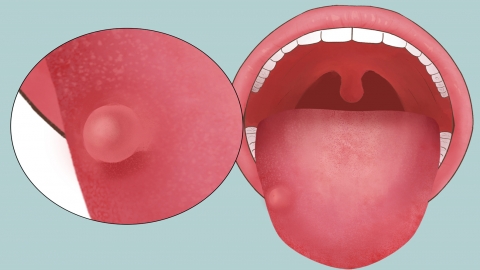Which diseases can cause tongue deviation?
Generally, the main causes of tongue deviation include sequelae of brain injury, facial nerve paralysis, stroke, intracranial infection, and multiple sclerosis. If tongue deviation occurs, it is recommended to seek timely treatment at a reputable hospital. Detailed explanations are as follows:
1. Sequelae of Brain Injury
Head trauma caused by impacts or falls may damage the brain's motor center or related nerves, potentially leading to tongue deviation after surgery. Rehabilitation exercises such as tongue protrusion and lateral movement should be conducted under a physician's guidance. Medications such as Cytidine Diphosphate-Choline Sodium Capsules, Piracetam Tablets, and Oxiracetam Capsules may also be used to improve cerebral metabolism and promote nerve function recovery. If significant cerebral scar tissue exists, surgical removal of the scar tissue may be considered to relieve nerve compression.
2. Facial Nerve Paralysis
Facial nerve paralysis can be triggered by exposure to cold or viral infections, causing facial muscle weakness that pulls the tongue toward the affected side. It is important to keep the face warm and avoid direct exposure to cold winds. For cases caused by viral infections, antiviral medications such as Acyclovir Tablets, Valacyclovir Tablets, and Ganciclovir Capsules may be used under medical supervision, along with Mecobalamin Tablets to nourish the nerves and promote functional recovery.

3. Stroke
Stroke caused by cerebral vascular rupture or blockage can damage brain tissue controlling tongue movement, resulting in impaired coordination and deviation of the tongue. Immediate medical attention is necessary. For ischemic stroke, medications such as Aspirin Enteric-coated Tablets, Clopidogrel Bisulfate Tablets, and Atorvastatin Calcium Tablets may be used under medical supervision to improve cerebral blood supply and stabilize atherosclerotic plaques. For hemorrhagic stroke, blood pressure should be managed according to the patient's condition, and craniotomy for hematoma removal may be necessary to reduce pressure on brain tissue.
4. Intracranial Infection
Infections caused by pathogens such as bacteria or viruses can lead to intracranial inflammation, which may irritate or damage brain tissue, affecting the neural function controlling tongue movement and causing tongue deviation. Treatment should target the specific pathogen under medical guidance. Bacterial infections can be treated with antibiotics such as Ceftriaxone Sodium Injection, Cefotaxime Sodium Injection, and Vancomycin Injection. Viral infections can be treated with Ribavirin Injection, Acyclovir Injection, and Ganciclovir Injection. Mannitol Injection may also be administered to reduce intracranial pressure.
5. Multiple Sclerosis
Autoimmune abnormalities can lead to multiple sclerosis, which damages the myelin sheaths of the central nervous system, impairs nerve signal transmission, and results in tongue movement disorders and deviation. Under medical guidance, medications such as Methylprednisolone Tablets, Prednisone Acetate Tablets, and Azathioprine Tablets can be used to modulate immunity and reduce inflammation, along with rehabilitation training to maintain tongue motor function.
In daily life, it is important to avoid prolonged exposure to cold temperatures on the face, prevent viral infections, control blood pressure, blood glucose, and lipid levels to reduce stroke risk, avoid head injuries by taking protective measures, maintain regular sleep patterns, enhance immunity, and undergo regular health checkups to monitor neurological function.




